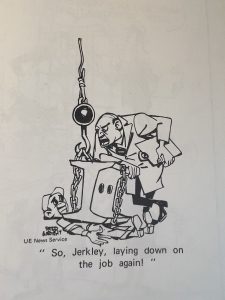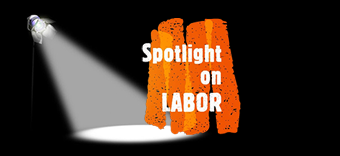JUNE BITS AND PIECES
NYC RAISES MINIMUM PAY FOR FOOD DELIVERERS
In a milestone for the fight for fair treatment of the lowest paid workers, New York City will become the first place in the country to raise the minimum pay for food delivery workers to something approaching a decent standard. These workers, who deliver meals to our doors when we don’t feel like or are otherwise unable to do our own cooking, average a shameful $7.09 an hour in wages plus the few dollars they can collect in tips. The city has now raised their minimum to $17.96 an hour, going up to $19.96 an hour in two years. They will still be able to collect tips. The two large companies that employ these workers, Uber Eats and DoorDash, are, expectedly, protesting the new law, claiming facetiously that it harms workers when all it really does is to make a small dent in both companies’ big profits.
IOWA ENACTS HUGE ROLLBACK IN CHILD LABOR LAWS
The trend among some states to exploit the labor of children took another step forward in Iowa May 26 when the state’s governor, Kim Reynolds, signed a bill that conflicts with the federal Fair Labor Standards Act’s prohibition of “oppressive child labor.” The federal statute outlaws teen-agers working under hazardous conditions or excessive hours that interfere with their schooling or health and well-being.
Among the Iowa act’s provisions are:
- It allows employers to hire teens as young as 14 for previously prohibited hazardous jobs in industrial laundries or as young as 15 in light assembly work;
- It allows state agencies to waive restrictions on hazardous work for 16–17-year-olds in a long list of dangerous occupations, including demolition, roofing, excavation, and power-driven machine operation;
- It extends hours to allow teens as young as 14 to work six-hour nightly shifts during the school year;
- It allows restaurants to have teens as young as 16 serve alcohol; and
- It limits state agencies’ ability to impose penalties for future employer violations..
The Iowa law is the latest in a series of similar laws enacted or proposed by Republican dominated state governments in the past few months. It follows an Arkansas’ law in March signed by Governor Sarah Huckabee Sanders, President Trump’s former press secretary, that loosened child labor protections.
The attack upon a century of steps protecting children from being exploited is part of a big effort by many companies around the country to gain access to low wage labor and weaken worker protections.
Economic Policy Institute, 5/31
WORKING AT DOLLAR GENERAL IS HAZARDOUS TO YOUR SAFETY
Dollar General, is a retail chain with 18,000 stores in 47 states. It is also at or near the top of the list of places with the most safety violations in the country, violations that put its workers and customers in daily danger. Over the past six years, the chain has been cited for fines that total more than $21 million for “systemic hazards.”

“Fred Wright cartoon courtesy of United Electrical, Radio & Machine Workers of America (UE)”.
These hazards, cited by the US Labor Department as “severe violations,” include aisles, emergency exits, fire extinguishers and electrical panels blocked by merchandise and unsafe stacking of boxers. In addition to the looming fines, the company has paid out millions of dollars to settle lawsuits involving injuries sustained as a result of unsafe conditions in is stores.
“Dollar General continues to expose its employees to unsafe conditions at its stores across the nation,” declared OSHA’s assistant secretary Doug Parker. Workers at the store report Dollar General’s general disregard for its workers in the form of low wages and poor working conditions while the company registered a profit of $3.3 billion last year. Its CEO raked in $16.6 million while the median wage of its employees was less than $20,000.
STARBUICKS FIRES ANOTHER UNION ACTIVIST
In his testimony before a congressional committee in March, Starbucks CEO Howard Schultz asserted that the company did not fire any employee for union activity. Yet, just two days later, a shift supervisor at a Buffalo store and one of the first members of the union, Starbucks Workers United, was fired from her job.
Alexis Rizzo, an employee for seven years was fired for her alleged tardiness, twice for being one minute late, once for four minutes and once for five minutes. Before she was involved in the union campaign, there was never any problem between her and the company.
Starbucks Workers United has filed an unfair labor practice charge against the company with the National Labor Relations Board, in addition to the hundreds already pending.
BEN & JERRY’S BUCKS THE TREND OF EMPLOYERS FIGHTING UNIONS
In a modern exception to the traditional hostility that employers have toward unions, Ben & Jerry’s recognized the union in its Burlington, Vermont, flagship store after its 39 workers voted for it. During the union’s organizing campaign, the company, unlike Starbucks, maintained strict neutrality. It did not conduct forced meetings to lecture workers on the “evils” of unionism or threats to move its facility or intimidate union activists or any of the other tactics that are the standard operating procedure of anti-union employers. Instead, it allowed the union, Scoopers United, an affiliate of the Service Employees International Union, to have time to talk to workers and space to post union material in the store. The company has committed itself to bargaining with the union. “We look forward to a sweet and collaborative future,” said a company statement.
SOME LIRR WORKERS ARE DOING 24 HOUR SHIFTS
The Office of New York Metropolitan Transportation Authority Inspector General released a report finding that over 4,000 LIRR employees were working 24 hours or more at a time. These workers are not covered by Federal Railroad Administration hours-of-service regulations. The crucial roles of engineering department workers, especially track workers, fall into this category. The accompanying fatigue leads to an increased risk of accidents.


